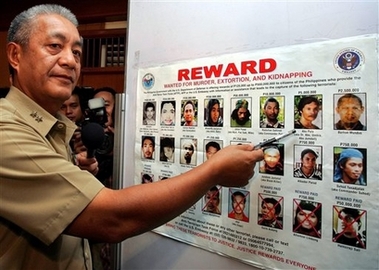Abu Sayyaf leader's death confirmed
(AP)Updated: 2007-01-20 19:44
MANILA, Philippines - DNA test results confirmed that the leader of the al-Qaida-linked group Abu Sayyaf was killed during a clash with Philippine troops in September, officials said Saturday.
The deaths of Janjalani and Sulaiman mark a major victory in the campaign to wipe out Islamic militants in the south of the archipelago after years of bombings and kidnappings.
The FBI conducted the tests on remains found buried in the jungles of southern Jolo island in December, comparing the DNA with that of Janjalani's imprisoned brother, military Chief of Staff Gen. Hermogenes Esperon said.
"The Armed Forces of the Philippines is proud to announce that we have neutralized the center of gravity of terrorism in the Philippines," Esperon said at a news conference.
President Gloria Macapagal Arroyo congratulated the troops and a spokesman said her administration was determined to wipe out poverty that breeds extremism.
Police warned that the Abu Sayyaf could stage retaliatory attacks.
"It is like wounded animal or a fighting cock - it can still throw a kick," said Romeo Ricardo, chief of the national police Intelligence Group. "We must remain alert."
Janjalani, who carried a $5 million bounty on his head offered by Washington, had been arrested but escaped from a cell at the national police headquarters in 1995. He took over Abu Sayyaf from his elder brother, group founder Abdurajak Abubakar Janjalani, who was killed in 1998.
Janjalani was killed in a clash with soldiers on southern Jolo island on Sept. 4, about a month after U.S.-backed Philippine troops began a major offensive there, targeting Janjalani and two Indonesian terror suspects, Umar Patek and Dulmatin, who goes by one name. The two are among the alleged masterminds of the 2002 nightclub bombings in Bali, Indonesia, that killed 202 people.
The Indonesians, also on Washington's most-wanted terror list, are believed to have fled to the southern Philippines shortly after the attacks.
Esperon said thousands of troops involved in the operation on Jolo will remain in place to pursue "Dulmatin and all other remnants of this terrorist group."
He thanked Col. David Maxwell, head of the US Joint Special Operations Task Force-Philippines based in the south for its "technical and service support" to the operation.
Janjalani and his key commanders have been charged with several deadly attacks in the Philippines, including a 2004 bombing that gutted a ferry, killing 116 people in one of Southeast Asia's worst terrorist strikes.
They also carried out a mass kidnappings, including the seizure of dozens of students and teachers on the southern island province of Basilan in 2000, and abduction of 17 Filipinos and three American tourists - missionary couple Martin and Gracia Burnham and Guillermo Sobero - in from a resort island in May 2001.
Sobero was beheaded by the militants and Martin was killed during a military rescue in June 2002 in which his wife was wounded.
Philippine army Special Forces troops and Abu Sayyaf gunmen clashed on Jolo on Tuesday and troops recovered the body of one of the militants, who was confirmed by the military the following day as Abu Sulaiman.
Sulaiman, an engineer whose real name is Jainal Antel Sali Jr., is believed to be one of two possible successors of Janjalani. He also carried a $5 million bounty from Washington.
The deaths of Janjalani and Sulaiman leave Radulan Sahiron, a one-armed commander, Isnilon Hapilon and Abu Pula among the senior Abu Sayyaf veterans still active, along with about 400 followers.
|
||
|
||
|
|

